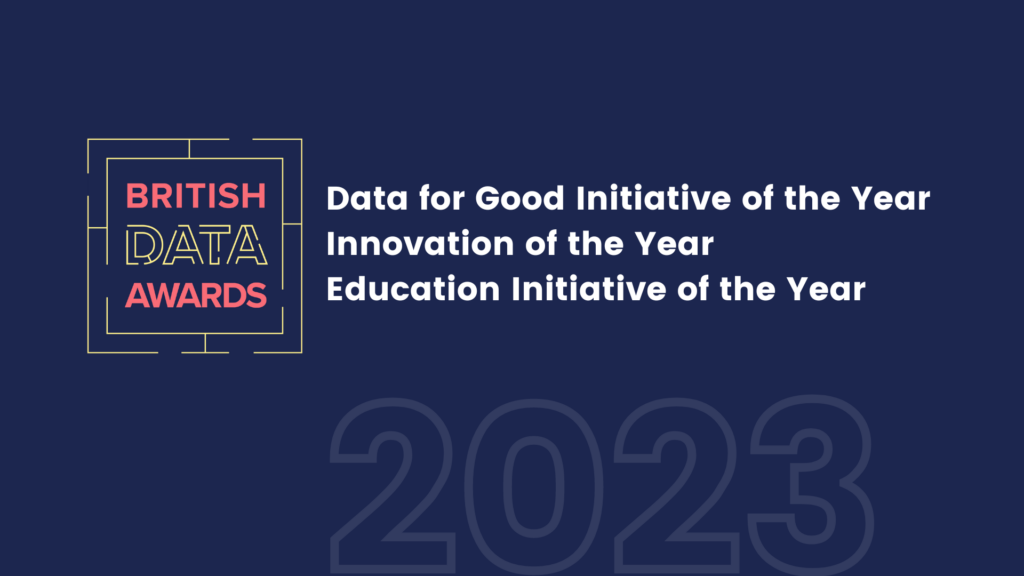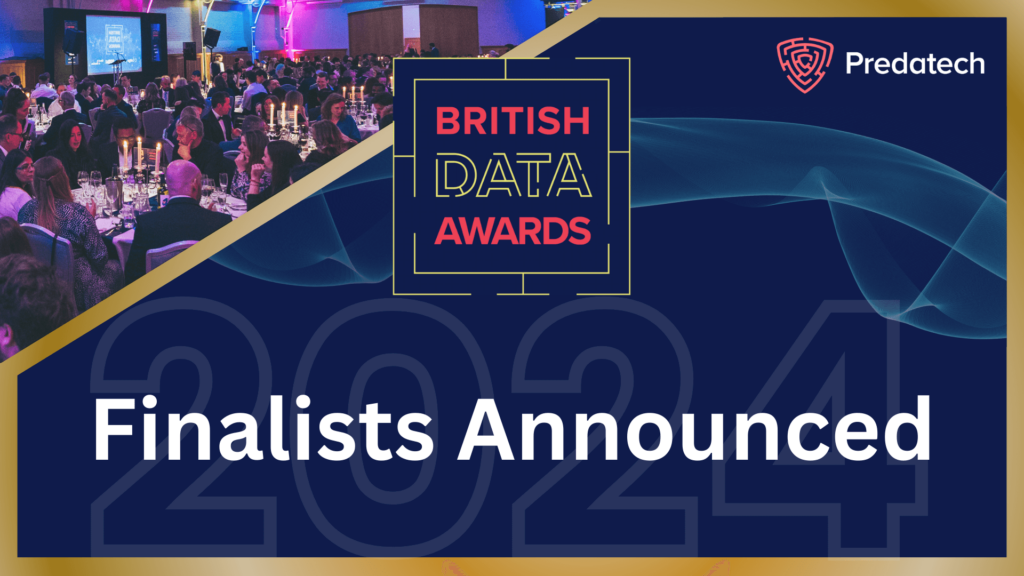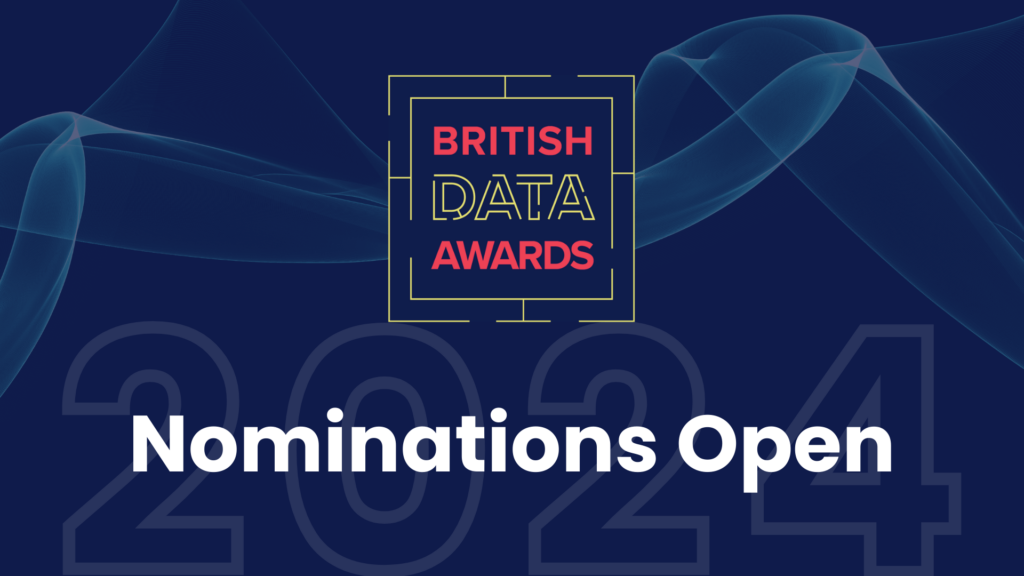With 226 nominations received, competition to be named a British Data Awards 2023 Finalist was tough.
In this blog, we meet some of the Finalists across three of the most popular categories and share an edited version of their entries with the wider data community.
The categories included in this blog are: ‘Data for Good Initiative of the Year’, ‘Innovation of the Year’ & ‘Education Initiative of the Year’ category.
Please note, the below entries are presented in alphabetical order.
If you’d like to stay up to date with the British Data Awards (entries for 2024 will open in January), please follow us on LinkedIn or Twitter.
Data for Good Initiative of the Year 2023: Selected Finalist Entries

The UK needs to deploy £40 million per year of low carbon infrastructure in order to reach their net zero targets but the current spend is only £20 million due to a stalled project pipeline.
Local Area Energy Plans are set to cost up to £250,000 per local authority. Replacing this cost with LAEP+ saves Local Authorities up to £200,000. Improved governance and coordination of local energy systems in line with strategic investment in gas and power network operators could reduce capital costs by 7% representing a total market size of over £4 billion per year.
Advanced Infrastructure has developed an innovative Local Area Energy Planning Tool (LAEP+) which is a spatial analytics platform for net-zero planning. LAEP+ digitalised Local Area Energy Plans and puts hundreds of datasets and analysis tools in the hands of councils and stakeholders. Local Authority and Energy Network users can identify sites for low carbon energy interventions, build project pipelines and attract investment.
LAEP+ uses digital twins to support decision making by local stakeholders and forecasts network capacity, building retrofits, heat networks, and EV rollouts all in one platform. Hundreds of API integrations ensure that all decisions are made on the latest, building stock, sociodemographic and energy network data.
Our LAEP+ platform and building stock data has been created to enable the shortlisting and triaging of buildings for different low carbon energy interventions based on criteria such as grid constraints, PV suitability, insulation, network capacity, deprivation indices and household income. LAEP+ building datasets include demand profiles, building fabric and desktop assessments of heat pump and PV suitability linked to UPRNs and addresses.
Through being awarded funding through BEIS modernising energy data applications taskforce we undertook a feasibility study interviewing over 50 local authorities, consultants and DNOs about the issues of working on local area energy planning and the transition process. The findings of the study identified the gap in the market for a collaborative, cloud based visualisation tool that provided the much needed data for all stakeholders involved in the Local Area Energy Planning process.
As a result of the project the very first product, LAEP+. was born to provide a new efficient and cost effective way for Local Authorities, DNOS and consultants to work together in one space. This opened the door to several innovative projects including being awarded a place on SSEN’s RESOP project and Oxfordshire County Council’s project LEO.
Currently there are no other competitors on the UK market that are able to combine whole systems optimisation, GIS tools and data in one platform. Our competition provide single-technology modelling tools but as of yet cannot provide the granular level of data, powerflow modelling and geospatial intelligence that Advanced Infrastructure provides.
We’re proud to continue working at the forefront of British R&D for cleantech – supported by our partnerships with De Montfort University, Sheffield University, London City, and London South Bank University.

In the next ten years, in order to radically cut carbon emissions, energy systems will need to accommodate millions more EVs, move away from fossil fuel-based heating and cooling systems, and convert homes into mini power stations that generate and store their own green energy.
Kaluza Flex has been built to connect millions of EVs and intelligently manage their charging so they import energy at the cheapest and greenest times, when there is an abundance of renewable energy. Powerful data that provides real-time insights is at the heart of this product.
In an effort to innovate how EVs are charged, Kaluza has been pioneering the world’s first and largest domestic rollout of vehicle-to-grid (V2G) technology. Through implementing bidirectional EV charging that allows car owners to earn money by selling surplus energy back to the grid, Kaluza is showcasing how V2G can be used as a pivotal component of the robust, zero carbon energy system of the future.
The Kaluza platform intelligently manages the charging of EVs by analysing real-time market data (such as grid supply, weather, and pricing data), and charging cars when prices and carbon levels are low. By integrating with V2G charge points, Kaluza controls when cars store energy and export it back into the grid in response to spikes in demand. Customers use Kaluza’s intuitive app to tell the platform when they would like their car to be ready to drive by and Kaluza optimises the charging to ensure they use the cheapest and greenest energy.
At scale, this means that cars can be used as a giant smart battery for the nation, enabling vehicles to absorb cheap wind and solar energy when it’s in abundance resulting in lower energy bills and a more resilient, decarbonised energy system.
To put this technology to test, Kaluza partnered with OVO Energy, one of the UK’s largest energy service providers, and major auto OEM Nissan to launch the world’s first and largest residential V2G deployment. The partnership resulted in 330 V2G devices installed across the country and over 3 million free miles made available to customers who exported energy back to the grid during peak times. It showed that V2G has the potential to save £3.5bn per year on grid infrastructure reinforcement, and that customers can earn an average of £420 to as much as £800 per year without needing to do anything except keep their cars plugged in when they are not in use.
Findings from the trial also showed an extremely high level of satisfaction among customers. A total of 93% of customers reported satisfaction with their V2G hardware and the level of concern around battery health dropped from 61% at the beginning of the trial to 24% at the end.
Kaluza is looking forward to continuing to put V2G data to the test through a partnership with Volkswagen and OVO Energy that takes V2G technology a step further with vehicle-to-everything (V2X) technology that will empower future EV drivers to unlock further potential from their vehicles, including to power their homes.

It is well documented that longer stays in hospital can lead to worse outcomes for patients. Ensuring patients are at the right level of care based on their clinical need, is critical to avoid overcrowding and to reserve hospital beds for those who need them most.
Recently released data from the NHS outlines the impact delayed transfers can have on patients due to deconditioning, including:
- Deconditioning contributed to delayed discharge in more than 47% of older patients
- 50% of patients experience functional decline between admission and discharge
An impact assessment by the Department of Health and Social Care on the Health and Care Act has highlighted that wider use of Discharge to Assess (D2A) models could free up as many as 6,000 hospital beds and save the NHS £7bn by 2031.
MCAP is supporting the NHS to tackle patient flow blockages, delayed transfers of care and stranded patients by using real-time, integrated data to identify opportunities to reduce ‘Length of Stay’. The MCAP solution uses data to typically identify twice the number of patients that can move to alternative pathways than previous Medically Fit For Discharge (MFFD) processes, combating patient deconditioning and blockages in bed availability.
At the system’s core is the internationally established MCAP Clinical Criteria, which are applicable for medical-surgical, mental health and substance use disorder care. For each level of care and age group, there are multiple criteria available to cover the reasons a patient would need care. The goal of the use of the criteria is to enable treatment of the patients as close to home, if possible (therefore supporting D2A models of care).
MCAP has worked with NHS England and NHS Improvement to embed their mandated daily review alongside the Royal Colleges of Medicine endorsed “Reasons to Reside” approach and automatically generates all NHSE Sitreps. MCAP can be completely integrated with current hospital systems, so whilst the clinical review is completed against its unique criteria, the inputs and outputs flow seamlessly to existing systems as required, ensuring the availability of the data to all levels of management within any Integrated Care System, avoiding data duplication or siloed data. The data can also be accessed remotely via a secure link, supporting staff to work remotely.
Implementation is proven to be fast and has been applied at over 175 hospitals in the UK.
Examples of benefits realised across the NHS by hospitals using the MCAP solution include:
- Reduction in Length of Stay in target wards of 2.35 days
- A reduction in delays and an annual saving of £324,000 per annum
- A 50% reduction in patients delayed due to pre-surgical admission.
- Reduction of patients delayed due to awaiting rehabilitation by 37%
Speaking post deployment of the solution across their CCG, a Senior Director commented:
“MCAP has proved invaluable in identifying admissions that could be avoided by streaming the patient to an alternative level of care appropriate to their care needs, this delivered significant savings to the health economy as part of our reconfiguration program”.

Our researchers recently performed an analysis of myalgic encephalomyelitis and chronic fatigue syndrome (ME/CFS) patient data using the PrecisionLife combinatorial analytics platform. ME/CFS is a massively debilitating chronic disease affecting more than 17 million patients who have a 100% unmet medical need. The disease presents with diverse symptoms and currently lacks known causes, diagnostic criteria, and treatment options. Patients’ lives are devastated and often cannot even get a definitive diagnosis, let alone any effective disease modifying therapies.
In 2022 PrecisionLife became the first group to identify reproducible genetic causes and risk factors associated with ME/CFS after more than 30 years of international research efforts into the disease. While traditional methods of data analysis found no genetic hits, our combinatorial analysis found 14 genes that were significantly associated with 91% of the patients.
These genes map to distinct patient subgroups each with unique sets of symptoms, underlying drivers of their disease, and treatment response, creating opportunities for precision medicine approaches. We have also observed several of these ME/CFS genes in long Covid and multiple sclerosis, helping to improve the biological understanding of these prevalent diseases which have shared symptomatology. Establishing the similarities and differences between them in more detail is likely to have profound implications for patients and the development of novel diagnostic and therapeutic tools.
In September 2022 we partnered with the charity Action for ME to present our finding at the ME Genetics Research Summit and share our analysis with international researchers working to improve the diagnosis, treatment, and prevention of ME/CFS. In December 2022 we published our study as an open access paper in the Journal of Translational Medicine, making it freely available to the research community.
These ground-breaking insights bring hope to patients and are enabling the development of more accurate diagnostic tools and selection of more effective, personalized treatment options for patients.

Nearly 500 British Sign Language terms relating to data science, cybersecurity and computing science have been defined and developed as part of a drive to ensure the Deaf community have equitable access to qualifications and careers in these fields.
We wanted to ensure that Deaf learners in schools who were studying Computing Science, Cybersecurity and the newly introduced school qualification in Data Science would have access to the terminology they need in order to learn concepts and to communicate with their teachers.
Language related to technology is evolving all the time, and lack of vocabulary should not be a barrier to learning and achieving. Unfortunately, there was a huge gap in BSL vocabulary for the technical language needed for Deaf people to participate fully in an increasingly data-driven society.
We worked with the Scottish Qualifications Authority to create lists of terms that would be needed by learners. We then established a UK-wide working group of data science and computing professionals who are BSL users to create signs covering the three subject areas.
Ben Fletcher, Principal Engineer with the Financial Times (and one of the team of experts on the project) described the problems of a lack of shared vocabulary: “Throughout my whole life I have studied and worked in Computing, having conversations in British Sign Language. Computing and BSL have been a difficult combination. There’s been a very large list of computing terms. Some of them I knew the signs for, others I had to make up. There were also some that I had no idea about. It was frustrating.”
Another of the team of experts, Pauline Jordan who is a Teacher of the Deaf, describes how this problem affects education: “I have to create new signs together with the children that I teach – however it is tricky when the children do not understand the term, so often I’ve had to invent signs to use.”
It quickly became apparent this project would make a huge difference in people’s lives, not just to students in computing and data courses at college and university level, but also Deaf sign language users in the working in technology roles. When discussing their own challenges in the workplace, particularly when working with interpreters unfamiliar with technical vocabulary, the Deaf experts noted how valuable it is to be able to signpost interpreters who they have not worked with before to the website in order for them to learn the signs they use.
500 videos were created for the signs, plus additional videos of definitions describing each of the terms in language suitable for school learners. The videos were uploaded to the website in March 2022. In less than a year, we’ve had over 54,000 hits on these new glossary web pages.
Innovation of the Year 2023: Selected Finalist Entries

Manufacturers don’t get to see how customers are using their drinks founts in bars, pubs and restaurants. The customers will often re-order refills or bag-in-boxes from wholesalers, where there is little visibility. This makes it harder to take risks, run trials, or properly innovate in this space.
Britvic has decided to do things differently and created the world’s first premium Tonic on Tap with their brand London Essence. The device itself has created huge benefits to sustainability, reducing 96% of packaging, but also has provided much needed insights into customer behaviours to help us grow the product.
The founts are fully IOT enabled, and the founts send data from their modem to head office via AWS into Snowflake. The data is visualised in a myriad of dashboards for different teams in SAP Analytics Cloud. This data provides insights into where customers are using the founts, at what time of day and which flavours of tonic are most popular.
This has provided valuable insights to our field team who can help customers to drive sales by applying the right flavours and knowledge to the venue, product teams who can refine and trial new flavours, and allows our field team to proactively service and maintain these founts – fixing issues before they arise.
The power of this data is vast and has opened up a huge array of future opportunities for Britvic across their full range of founts. Most importantly, it is driving the conversation around sustainability, reducing packaging and CO2 emissions; a core facet of the Britvic Mission2025 strategy.

In 2022, Essex County Council’s Data & Analytics team took on the challenge of estimating the impact of the emerging cost of living crisis upon our future volumes of children in care. It is widely acknowledged that there is a correlation between increased child poverty, financial stress, and children in the care system, and ECC wanted to understand how our future may look, in the wake of inflation rising to 10% and beyond. The purpose of this work was to help the organisation prepare for potential demand shifts, and to simply understand the challenge that could be ahead.
To begin, the work forecasted potential levels of deprivation that we may see in Essex if inflation rose to certain levels. To provide assurance and build confidence in our approach to forecasting deprivation, we collaborated with Dr Calum Webb from the University of Sheffield. We worked with Dr Webb as he had been a peer on existing research by Professor Paul Bywaters, an academic leader in the field. Alongside this, we used logistic regression to determine the effect of decreased real earnings upon volumes of children in care.
Once we, and Dr Webb, were satisfied with our methodology, we applied the forecasted levels of deprivation to our children in care forecast. We were able to calculate that a 1% decrease in real earnings leads to a 0.6% increase in children in care starts. When applying this alongside the Organisation for Economic Co-operation (OECD) forecast that real earnings would fall by 6.2% over the next two years, we were able to forecast an additional 21 children entering care over the same time.
This is the first time we have taken such an approach to forecasting potential change in service volumes within the children’s and families service, and is also the first time we have closely collaborated with academics outside of Essex to build trust and assurance in our work among our internal stakeholders.
The delivery of this work has not only provided our children’s leadership team with the insight to prepare themselves for potential demand change but has also enabled them to identify preventative opportunities to intervene and stopping children from reaching the point of entering care.
The project has also helped to upskill the organisation around data usage. Partially, this has taken place through the collaboration with a respected academic in the field. Collaborating with Dr Webb enabled us to upskill members of the analytics team by learning from him, but has also increased the confidence of stakeholders in children’s services around the application of analytics in a sensitive area.

Pimloc is an AI company that puts data privacy at the heart of what we do, while still facilitating growth for businesses. With surveillance becoming ubiquitous and more visual data being collected than ever (across various CCTV cameras, ANPR, drones, and bodyworn cameras), it is vital that people’s personal data is protected.
Often, organisations wish to harness visual data to improve their business strategies, marketing, or security, but struggle to do this while adhering to data protection laws. The two do not have to be mutually exclusive. Our product, Secure Redact, helps address that gap innovatively by allowing them to reap the benefits of video data, while still prioritising privacy.
We believe our entry, Secure Redact, should be shortlisted as it is a novel and sophisticated system that has eased the burden of data compliance for individuals and organisations across multiple sectors.
Secure Redact is made up of two components: one detects personal data within video content (such as faces, heads, and vehicle registration details) and the second element is a suite of intelligent tools able to review these personal identifiers and automatically redact and anonymise the information. Our technology can be deployed selectively to remove some or all identifying information, depending on the requirements of the user.
Secure Redact is highly accurate, as our AI has been trained using a more diverse range of images and video from real-world footage than our competitors and we continue to improve our underlying technology. Furthermore, we use supervised learning and proprietary deep learning techniques which allow our AI to detect information even in low-quality or low-fidelity video. Our systems are flexible to suit the user’s deployment needs, be it via APIs, on-premise, or via cloud solutions.
An hour of CCTV can contain 2 million faces and manually redacting every image of personal data from every frame can be an expensive and difficult task that can take users days or even weeks to complete. With Secure Redact, this task can be completed 200 times faster, providing companies with a more efficient and accurate tool to anonymise video footage, and opening up new opportunities for its use. As a result, video clips that have been selectively anonymised with Pimloc’s technology can be supplied externally as needed – for example to employees, customers, lawyers, law enforcement, and more.
Pimloc has helped hundreds of customers accelerate the process of anonymising footage, helping them comply with data privacy laws and regulations. Our client base spans a range of industries including transport, entertainment, insurance, health, and security. Our solution provides a quick, efficient, and easy-to-use solution that can be scaled up or down depending on need, with additional capabilities such as people counting.
Secure Redact is an invaluable resource for processing data subject access requests under the Data Protection Act and has simplified the process for many users. We have numerous customer testimonials, as well as official accreditations which speak to the value of Secure Redact, as well as its professional standards.
Education Initiative of the Year 2023: Selected Finalist Entries

The UK Data Academy at Admiral Insurance was formed in March 2022 and launched its first development programme – Data Futures – Future Seniors to the Admiral Insurance Data Community in July 2022.
The department grew to 3 individuals from September and the Data Academy was formally launched to data colleagues in October 2022. Since its launch, the UK Data Academy has created a monthly ‘What’s going on in Data’ newsletter which has achieved almost 1500 reads, has created a strong, active Data Community within Admiral through Teams and virtual as well as in person Lunch & Learn sessions (average attendance 150 people) and has launched a Future Seniors – Future Manager programme, created a Data Leadership Network, offered the first of its Training Pathways on Data Visualisation and Storytelling to over 400 data colleagues and has launched a Pilot of a complete organisation Data Skills for All training pathway to uplift data fluency for the organisation.
As a small department, this is a huge accomplishment and has meant that over 30 individuals have benefitted from a development programme, with another 25 set to join a programme throughout 2023. We have also placed 30 data professionals with mentors to help uplift our awareness of the diverse roles in data available at Admiral.
Our first development programme feedback was exceptional, with a 9.5/10 score when participants were asked if they’d recommend the programme to colleagues, and a 9.25 rating for the programme overall. We are excited for our journey through 2023 and beyond and are hugely proud of what we’ve achieved to date.

In response to the emerging data skills gap, James Kelly, Corndel CEO, leads the charge – “There is well-publicised proof that the UK is in the midst of a data skills shortage. The government’s own data found 48% of businesses are recruiting for roles that require hard data skills, but 46% have struggled to recruit for these roles over the last two years.”
Corndel worked in partnership with Imperial College Business School London to deliver data research to assist our strategic skills development with our clients.
Through this research, we continue to grow and enhance our Data Academies and data learning capabilities in a responsive and agile way, ensuring our Levels 3, 4 and 6 Data skills programmes deliver development based on the workforce’s needs.
There are two core elements to Corndel’s data strategy:
– Our Professional Development Experts (PDEs) have been hands-on, senior leaders in data, making them more relatable than regular coaches and can truly support organisations and learners.
– Our data programmes are designed to respond to market needs directly, align with company objectives and help futureproof learners’ careers.
Our strategy yields impressive results. We have recruited a diverse team of Corndel’s Data PDEs who are proven to be experts in their field:
– 37% of Corndel’s Data PDEs have a PhD in a STEM subject
– 60% of Corndel’s Data PDEs have at least a Masters level qualification in a STEM subject
– Corndel’s Data PDEs have an average of 13 years of industry experience in a data-related role
– 40% of Corndel’s Data PDEs have an undergraduate teaching qualification or higher
– In 2022, learners on our Data Analyst Level 4 programme had a 100% pass rate, with 65% receiving a distinction
– 98% of learners either strongly agreed or agreed that their data coaches were knowledgeable in their subject area
– The feedback on the workshops delivered is similarly positive: 70% of respondents the word “knowledgeable,” 48% used the word “interactive”, and 33% used the word “professional”
Corndel has an active Data Advisory Board, which brings together leaders from industry and academia to educate organisations on how to embed a culture of data in their businesses. Our programmes provide real, tangible benefits to learners and employers. Of those who undertook a data qualification with Corndel in 2022:
– 73% of learners are more confident in doing their job
– 64% feel more prepared to take the next step in their career
– 34% have greater responsibility at work
– 25% received a pay rise
– 25% received a promotion
– A recent Ofsted inspection saw 90% of learners giving Corndel top marks on every evaluation measure.
Robbie Watson, Future Skills & Learning Manager, bp: “The jobs of the future are very different, and traditional career paths are becoming more irrelevant. The Data Apprenticeship is a great way to prepare the business and our people for that future.”

Improving the attendance of pupils in schools is a government priority. This project is a ground-breaking, rapid implementation of automated daily ingestion of pupil attendance data from schools in England, on a voluntary basis.
In November 2021, the Secretary of State asked us to obtain daily attendance data as rapidly as possible, as part of the strategy to improve attendance. This is very significant change from a well-established more manual, termly (three times a year) collection, to an automated daily data feed from schools’ management information systems (MIS).
A new fully automated daily data ingestion and reporting solution were delivered within 3 months. This involved:
- Exploring the best way for DfE to obtain daily data rapidly in an automated way from schools in England
- Developing secure reporting products which add value for the sector, allowing consistent daily view of attendance to support improvement across schools, LAs and MATs
- Developing internal dashboards and reporting for DfE
- Engaging stakeholders across the education sector including 24,000 schools, 150 LAs, MATs, and 16 school MIS suppliers
The team:
- Set up the commercial process for data ingestion
- Designed and developed a cloud-based solution for quick ingestion of large volumes of data from supplier APIs, thus enabling the department to move from termly attendance data collection to automated daily data collection.
- The solution involved building data pipelines to ingest and process daily attendance data for 7 million pupils. The solution was ready to use in less than 3 months.
- DPIA and Principles of Use document was developed and published
- Designed, built and tested sector reporting products
- Radically changed statistical publication to Publish fortnightly public data on attendance, which previously happened termly with a 2 month lag
- Designed and built internal reporting products
- Data volumes are at 14 million records daily
Continuous user research with users across the sector has, and continues, to be the corner stone in developing the reporting products.
Testimonial
Local Authority: “We are particularly finding the timeliness of the comparative data on the public dashboard very useful for regular indicator information. The data has been useful for discussions at target support meetings. Whilst the data is relatively new, we have used the information alongside our local data dashboard to consider patterns and trends across time and this has enabled the LA, alongside schools and the alliance to begin to hone in on particular issues causing concern collaboratively as well as help to inform our deployment of officer time to schools via a RAG rating system for which the data was very useful”.

The Nurture Programme creates lifelong connections where curious minds no longer struggle to start their journey. An educational platform to accelerate learning and build a data-first mindset. Nurture provides ‘real-life’ experiences for MSc Data Science students, accelerating academic impact and providing additional capability for business. Supporting learning, outcomes, and positive destinations.
“We’re delighted with the success our graduates have in landing roles as Data Scientists, the Nurture Programme definitely plays an important role in this fantastic employability record” Nathan Topping, Salford University
YoY, we’ve increased the number of Nurture students we’ve been able to support. The 2022/23 cohort almost doubled (134-238 students). We’ve invested in technology and people to triple our capability, elevating the early careers of those entering the profession. We partner with universities and industry, providing a springboard for discovering the challenges presented by real datasets. The projects inform students’ final dissertation and provides practical experiences that bring theory to life.
“The Nurture Programme has become an integral part of our MSc Data Science [course] and has proved an invaluable opportunity for students to gain real-world experience and work on solving a live business challenge.”
In 2022/23 Nurture has:
- Increased the number of LIVE industry placements by 39% with 40% female participation.
- Developed & delivered course content – alongside award-winning data leaders – aligned to industry needs.
- Hosted the #AlumniSessions – an open-access webinar series – upskilling Data Professionals (typical attendance circa:150).
- Piloted ‘Pyxis’ with an ‘escape-room’ STEAM workshop alongside The Alan Turing Institute, Camden Council & the Chaucer Group.
- Hit national headlines with programme success that saved National Highways £.
“The data science recruitment market is really competitive. We have to think about innovative ways to get the best possible people into National Highways. The enthusiasm and willingness of the interns blended really well with the experienced members of the team. It has given us an excellent work dynamic.” Davin Crowley-Street, CDO
“The Nurture Programme has always been the purpose behind our business. Our goal is to help the next generation of talent to engage, gain work experience and find employment. Lucy Lynch has developed so much and continues to drive tremendous value. I feel like we now have the blueprint for, what could be, a national initiative.” Jez Clark, CEO Eden Smith Group.
Nurtures’ ‘Pyxis’ was developed and piloted during Camden’s STEAM Ambassador Programme. “The workshop generated stimulating, inspiring and challenging discussions for us to takeaway, exemplifying the importance of creating ethical digital futures together.” Janis Wong, The Alan Turin Institute. “Helping the next generation to understand and be curious about data will give them the skills that will benefit them in any career they choose.” Marion Shaw, Head of Data & Analytics at Chaucer Group.
WHAT IS THE AMBITION?
To support national plans, reduce the skills gap and build a data literate nation that puts the UK at the forefront of a global industry.
HOW WILL WE ACHIEVE THIS?
- Expand our Nurture network, increasing ‘live’ data science & IoT placements.
- Launch Pyxis STEAM workshops, engaging students/educational institutions.
- Engage, mentor, and provide ‘levelling-up’ opportunities to diverse groups.

The war between Russian and Ukraine has led to the displacement of over 5 million children, some of whom are now hosted within Northern Ireland.
The process to find these children school places was started manually by making phone calls directly with schools to place children, often schools not knowing themselves if they had a place, in a particular year group and with appropriate language support. This task proved to be most inefficient and extremely time consuming.
The Data Analytics & Insights team took on the challenge to collect and analyse data in a way which had never been done before and upskill the staff placing the pupils in how to use the data and dashboards. The data is decentralised and stored locally on school sites. We setup a process to capture timely and pseudonymous data from all 1500 school sites, we collected data from the Dept of Education on School Intake figures, along with seasonable variance data, and then combined and prepared this data within a dashboard to enable the easy and seamless placing of these children.
The dashboard displays and calculates not only schools with available places but considers the special needs, language spoken, cultural and ethnic background diversity across each school. All this data makes the placing of children more efficient and less time consuming and using real time data to impact on the most appropriate place for these vulnerable children. We use a mapping tool to identify areas of NI with greatest available school places, focusing initially on specific council regions with available places.
We are very proud that our use of data analysis and dashboards has helped to place many hundreds and potentially thousands of children in a safe, and stable environment where they can actively continue their education. With this data they are placed in suitable schools where others may speak their language or come from a similar ethnic background.
This data offering within our organisation has had such an impact that it has been expanded into further services. It assists services with running language clinics in specific council areas, enabling greater focus on what is appropriate for that area in turn saving pressures on the financial budget. Our admissions department have directly used this this data to provide migrating families with information on schools with available places, a process which may have taken a parent very many stressful phone calls to obtain.
This data project is a model of how we can use data to directly improve the lives and wellbeing of children and the quality and continuation of their education.

Digital Savvy came about because of a need to bridge the gap between data analysts and end users, working across a large client account within JLL. Our industry-leading analysts produce high quality dashboards and data visualisations, but how often are they used in order to make data-driven decisions? Data is only of value if it is used – how can we help our users understand our data with confidence, find a narrative, tell stories and inform decisions, especially if our users are not encouraged to adopt and explore our interactive outputs to their best potential?
Digital Savvy was a series of internally created instructor led courses combining data literacy skills around reading and understanding charts and telling stories with data, with practical walkthroughs of our key dashboards. The key taught element consisted of six sessions, attendees learned the key skills needed to gain confidence with data – from gaining familiarity with the decisions behind different chart choices to learning the importance of finding a narrative to tell their data story, as well as more practical knowledge around accessing and navigating dashboards with confidence and contacting their BI representatives. A project element consisted of the creation of a presentation or document for attendees to demonstrate going above and beyond their usual use of data in order to tell a story with data about their site or region – these in turn are generating ideas for future outputs for the BI team. And optional additional materials gave delegates the option to read further supporting materials concerning the digital world, giving a wider overview of their data environment.
Digital Savvy recognised the range of roles, subject matter expertise and data awareness across the breadth of the account, tailored to increasing data awareness and confidence across a range of personas. This allowed the course to be pitched at a wide range of experience and confidence levels with data, with the sole aim of reinforcing and improving data knowledge and confidence at all levels. In recognising that increased data usage comes from an increase in awareness and confidence, we did not set pass/fail questions based on technical understanding of data, but assessed the success of the program from the standard of end projects and qualitative feedback.
Digital Savvy started as an initiative to promote data use, increase data confidence among our users and raise the profile of our team’s world class data visualisation output. It was a chance for users to move away from including single figures in PowerPoint presentations, or downloading data to pore over and re-analyse in Excel. As a result of its success, it has been the basis of an expanded and newly-formed Global Data Fluency role across the account and the creation of scalable deliverables to be potentially phased into more accounts across the wider organisation. As a result, more bespoke courses and onboarding materials are now being offered to more people than ever – increasing data confidence account-wide and further enhancing data culture.

The success of Vodafone Business UK’s Data Literacy Programme was born out of the need to empower over 2000 Vodafone Business UK employees to become data self-sufficient to drive first-rate decision making and create better quality conversations between business users and the growing number of data experts in the organisation.
Our journey started with an organisational assessment and benchmark of Vodafone Data Literacy to identify our strengths and gaps. It provided us with the insights necessary to shape a training roadmap for the future. Vodafone Data Literacy was also benchmarked against 600 publicly traded organisations across 17 industries, whose results provided the evidence needed to engage the Vodafone Business UK Leadership team and gain their support for the programme.
The Programme is built on three pillars:
(1) Data Champions community – our Data Champions are the driving force behind the success of the Data Literacy Programme. 60 data advocates from across the organisation who have self-selected to promote data literacy amongst their team colleagues, signpost resources, share best practice and encourage enthusiasm and excitement for data. They are, in essence, the Data Literacy team’s extended arm.
(2) Data Learning paths – we need to upskill our entire division to make Data Literacy a reality. A wide range of training resources have been created to target three distinct groups:
(2.1) Data Champions go through a combination of an 8-week instructor-led training workshop and self-paced learning. The workshop is designed to provide our champions with the knowledge and skills they need to be true advocates. They also undertake two assessments: one to identify what type of data persona they are so the self-paced training is tailored individually to them and a second one to evaluate their data skills so their results can be compared with those after the training workshop is completed.
(2.2) The Data Curious have access to a Learning Classroom with dedicated data training only available via registration.
(2.3) The Data Sceptics. Doubters are tempted to data upskill via short & snappy material e.g. storytelling video clips available via an open training space that also caters for broader training needs.
(3) Data at your fingertips – democratising data across the business. This allows our colleagues to promptly access the data they need without having to go through a complicated process or wait for a data analyst to provide it. A calendar of drop-in sessions is in place for subject matter experts to showcase how best data can meet their use cases. As a result, active users of our dashboard catalogue increased by 25% (vs pre Programme launch) and the number of accesses shot up by 75%.
The front gate to the Data Literacy Programme is the “Data Hub”, a visual one-stop shop for all data things that has become the go-to place for the company’s data enthusiasts.
The Data Literacy team is very proud of the traction the Programme has gained since launch and is looking forward to helping Vodafone in its quest to connect people, places & things for a better future.




